Kampot, Cambodia

Pheakdey greeted us with a smile and a big hello as we approached her restaurant, Sister’s II. Before her door sat a squeaky clean display case with fresh baked goods inside. Few were those who made it past this bounty of brownies and cakes without a pull of great temptation. It was a landmine in a land mostly short on sweets.
However, for my mother, the pull came from elsewhere, somewhere beyond the cakes, from inside the restaurant. I stood confused, wondering how she could pass the brownies by. Then I followed in curiosity. A collection of books had caught my mom’s eye through the glass doors. Going in to investigate, her suspicions were proven correct. They were not just books, but Bibles. Four banners, two on each wall, revealed further hints of a discovery greater than chocolate. First in Khmer, then in English, the banners read four central Bible verses of the gospel, including John 3:16.
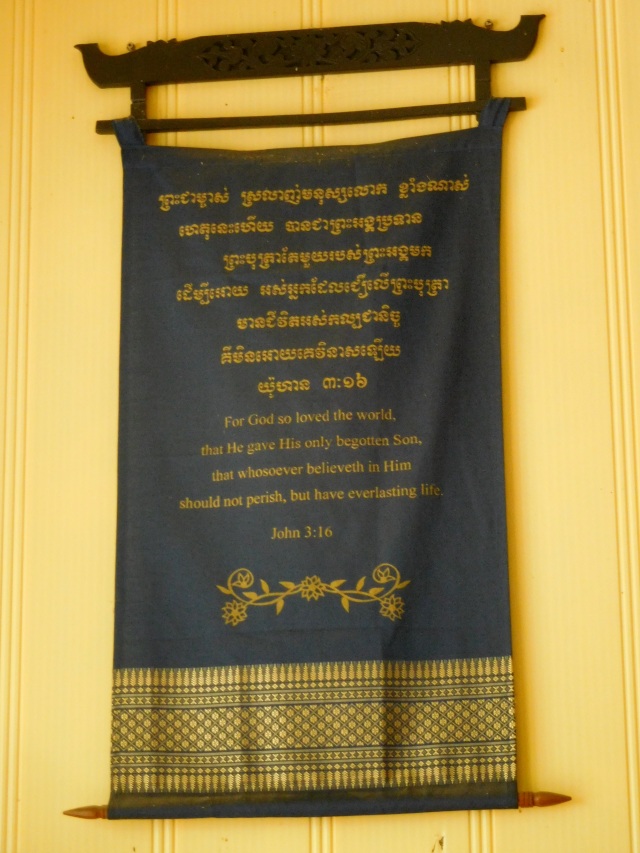

Intrigued and elated to have found each other, we all sat down at one of the tables. It was late in the day, the room empty, and a perfect time to talk. Pheakdey explained that the Bibles were not hers, but for sale. Most were in Khmer, some in English, and were primarily bought to transport to the capital, Phnom Penh.
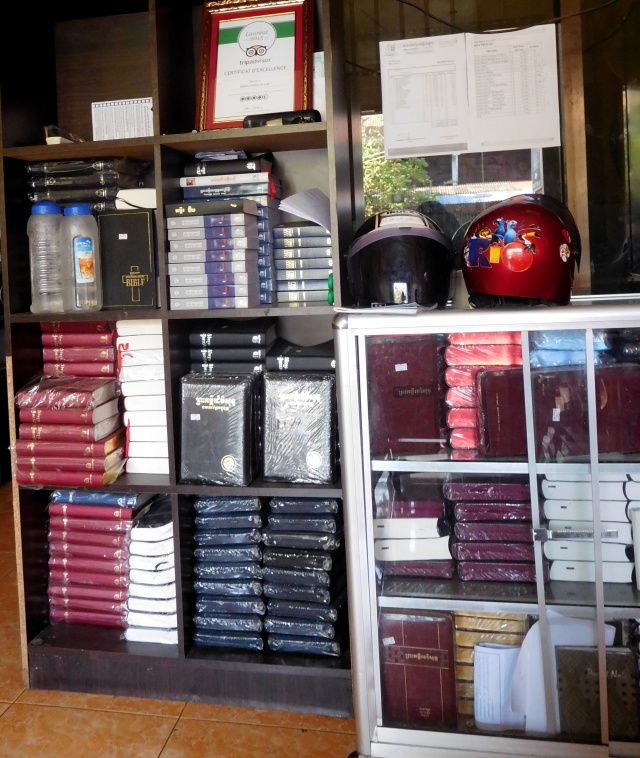
Although the famous archaeological site of Angkor Wat was a Hindu temple, 95% of Cambodia’s population follows the teachings of Buddhism. With that last 5% shared between Islam, Hinduism, and Christianity, the chances of meeting any Cambodian Christians without prior connections would have been slim, if not miraculous. Yet there we were, meeting with a Christian sister whose life was nothing but a miracle itself.
She grew up an orphan, although cared for somewhat at first by her grandmother. At around age 12, Pheakdey received news that her mom had been found in Phnom Penh. Young, vulnerable, and without siblings, Pheakdey went in the car with those who had supposedly seen her mother. While driving, the car was slammed in an accident, pinning Pheakdey’s leg. The occupants of the car fled the scene, leaving her there alone. In what must have been agonizing pain, she was brought to the hospital where her leg was amputated.
Cambodia may hold one of the highest amputee percentages in the world. Unfortunately, the stigma towards disabled persons is a demoralizing one. Although the Buddhist religion encourages acts of good will to others, belief in karma bears more potency. Karma creates the kind of mentality that watches a building burn without consternation because “those who deserve to live will escape.” In the same mind-set, disabilities befall those who have committed some wrongdoing either in this life or a previous one. The disabled are seen as humans receiving their just deserts. Instead of being redeemed, they are spit on and excluded.
Open a restaurant? Why do you want to work? You don’t have a leg. You should go out and beg for money.
These were the kind of antagonizing comments Pheakdey received after her accident.
No one will marry you unless he has only one leg too.
But two miraculous outcomes of that accident and subsequent pain have been the cause of the constant praises that now stream from Pheakdey’s heart. As she told us her story, she also gave heartfelt praise to the Lord saying “God is so good!”
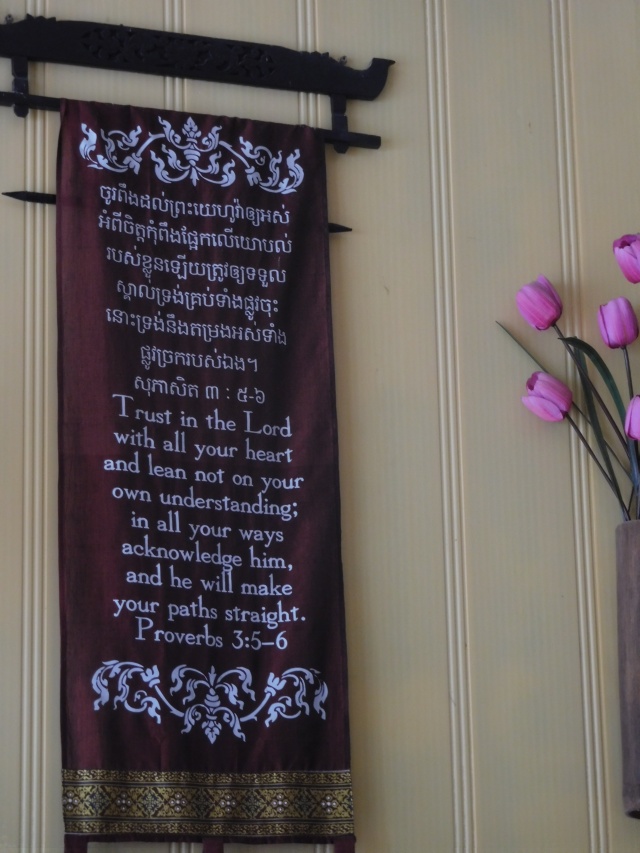
From the hospital, Pheakdey was placed in an orphanage started and run by US citizens. It was there that Pheakdey was taught the gospel of Jesus and grew up in faith. “Everyone was together. The disabled played and went to school with the others. No one was separated, ” she related, smiling at my sister Grace.
When she was old enough for college, Pheakdey traveled to Phnom Penh where work and learning opportunities were more plentiful. “God please send me a husband,” she prayed. In the face of others’ pessimistic opinions, she persisted before God, “I know you have good plans for me and can supply anything.” She was conscience of the bigger pool of men in the large city.
She did indeed meet a man whom she liked, but he did not share her faith in Jesus. After sharing the gospel with him two or three times, Pheakdey prayed “I really like this man, but he refuses to accept the gospel. If I tell him about You again and he still does not receive it, then I will know he is not a man from You.” At her last relation of the gospel, the man asked to go to church. He wanted a Bible to read for himself and someone to help him understand it. As he studied, he turned wholeheartedly to the truth.
Why are you marrying her? There are many pretty girls you could marry. She is missing a leg.
Cutting words flew like a flurry over the wedding of a man with two legs to a woman with one. Put down as if she was nothing, Pheakdey wondered to her husband why he married her. “Because you are special, Pheakdey. There is no other woman like you. You have a beautiful heart,” he reassured her. Tears sprang to her eyes as she remembered the rejection of friends juxtaposed by the deep love of her husband.
Love in turn and love again transformed and saved not only Pheakdey’s life, but her son’s. Left in the hospital, abandoned by his parents, once lay a baby boy with dark brown skin. Dark skin in South East Asia is undesirable, viewed as a characteristic of the lower class.
Pheakdey empathized with the discarded child and went home to talk the matter over with her husband. They decided that they would pray. If after 10 days the baby was still in the hospital, unclaimed, then that would be God’s green light to adopt him. That baby boy’s name is Moses. He is a shy, sweet child who says hello or goodbye when entering or leaving the restaurant. He is a blessing to his mother and has a caring, strong faith in Jesus.
Pheakdey and her husband also have a beautiful daughter of their own named Mary. She is a few years older than Moses, looks quite a lot like her mother and helps at times in the restaurant.
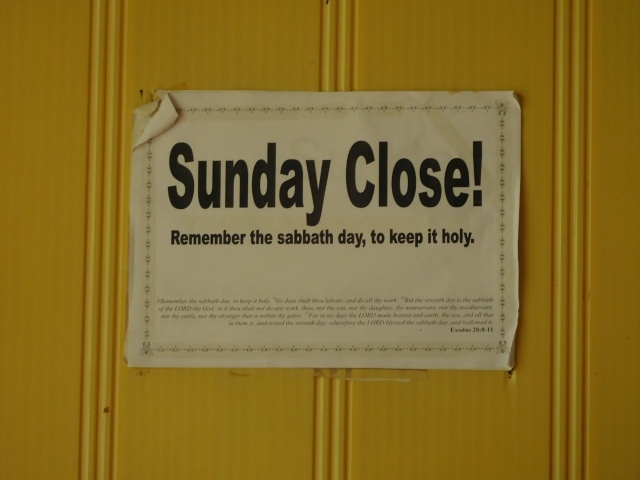
After the car accident as a young teen, Pheakdey discovered that she was being taken not to see her mother, but to be sold as a sex slave. Although to the Buddhist world, Pheakdey’s disability revealed a curse, in her eyes it represented redemption, rescue, and love. She knew that God chooses the weak things of the world to confound the wise.
She was told to beg, but now she lives in an abundance of love and eternal security. Her constant praise and continual prayer is to remain neither rich nor poor. Her husband is a pastor, her restaurant thrives, and her Redeemer lives.

She is considered different in her town because of the way Jesus changed her. She reaches out to the needy, so her neighbors laugh and call her a friend of the crazy people. “I don’t mind that they say they are my friends. I love them too,” is her shrug of the shoulder, Christ-like response.
Close to her home in Kampot, Pheakdey passes on her love and skills to help in a nearby orphanage. Owing her cooking and baking knowledge to the American who ran her orphanage, Pheakdey employs any orphans who want to work in her restaurant. She talks with them about the power and mercy of Jesus at every opportunity and provides for them as her own. “Jesus is coming soon,” she says, “the world is changing. I pray He’s coming soon.”
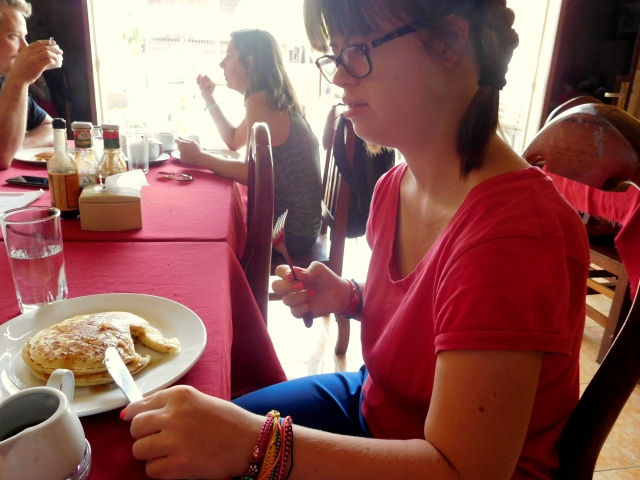


[…] During our time in Cambodia, we were traveling with three extraordinarily wonderful Spanish friends. They had found a great spot for brownies and kept telling us about it. One evening, my mom, sister and I walked over to the restaurant our friends had mentioned. When we got there, my mom almost immediately recognized a set of Bibles stacked on a shelf in the restaurant. And that’s how we connected with Pheakdey and learned her victorious story about how she was rescued in a peculiar way from being sold into the sex trade and became a Christian. She was once an orphan. Now she has a beautiful family and works with the orphans in her local orphanage. Read about her incredible testimony here! […]
… [Trackback]
[…] Read More: faithstravels.com/2016/04/29/pheakdeys-miracles/ […]